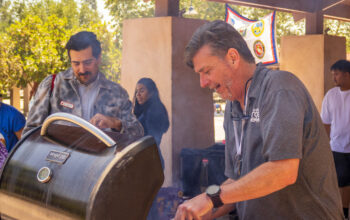Semesters can be long and boring but students will have the chance to walk through what would seem like a normal classroom door, only to be introduced to a world filled with wizards, witches and shape shifting creatures.
In the spring semester, the English Department will offer a class for which the entire course material will consist of the novels from the Harry Potter series.
“I think there’s so much depth to the novels in the same light that I think we can see in Mark Twain’s writing,” said Mickey Harrison, associate professor of English who will be teaching the class. “Somebody can get an enjoyment level of the entertainment value if you’re eight years old, but you can read it till you’re 88 and you will continually get different messages and themes.”
It’s this magic of the novels that society has begun to appreciate and incorporate in the canon of literature that can be studied, according to Harrison.
Written by J.K Rowling, the novels tell the coming-of-age story of Harry Potter, a boy wizard thrust into a hidden world of magic that exists parallel to the real world, and chronicles his life to adulthood.
The popularity for the series has been nothing short of astronomical, spawning a series of eight movies, merchandise and theme parks. The brand is estimated to be worth as much as $25 billion, according to an article in Time Magazine.
This interest in the Potter universe has also been demonstrated through the amount people that have already registered for the class.
“Last year, I almost had my children’s literature class cut because I didn’t have the minimum required students,” Harrison said. “This year, after a week of registration, it’s maxed out at 35. I’ve had two former students ask to be on a wait list, and two other students I’ve never met before tell me they’re taking 101 in the winter because they want to take my Harry Potter class.”
Kristine Alcala, a 23-year-old philosophy major and a fan of the series, is interested in the class, but wasn’t able to register in time to secure a seat.
“I remember reading the Philosopher’s Stone for the first time when I was younger and I was captivated by it and instantly became a fan,” Alcala said. “I really wanted to take the class, but if it’s offered again in the fall, I’d take it.”
Though English may be thought of as a field of study that would be comprised of more classical writers like William Shakespeare, Sylvia Plath or F. Scott Fitzgerald, the interest that students have shown for taking this class could influence other departments to offer classes with unorthodox and interesting material to engage more students.
“I think it’s a great idea and a new way to get students involved in reading more literature,” said Department Chair and Adviser of English Donna Accardo. “It’s important to realize that though the content of the course is not written for a college audience, the approach to that literature and the analysis behind it is appropriate for college-aged people.”
Harrison agrees that offering non-traditional material benefits Pierce, which like other campuses within the district, is experiencing a low number of student attendance.
“I do believe that as educators, we do fall into that trap of wanting to teach stuff that we love, with the hopes that students will also find the same connection, and I’m guilty of still doing that,” Harrison said. “What I would like to do more is offer texts that the students want to read.”



